UNIT 12 INNOVATION LESSON 2 Aha Moment课件(共37张PPT,内镶嵌视频)-高中英语北师大版(2019)选择性必修第四册
文档属性
| 名称 | UNIT 12 INNOVATION LESSON 2 Aha Moment课件(共37张PPT,内镶嵌视频)-高中英语北师大版(2019)选择性必修第四册 | 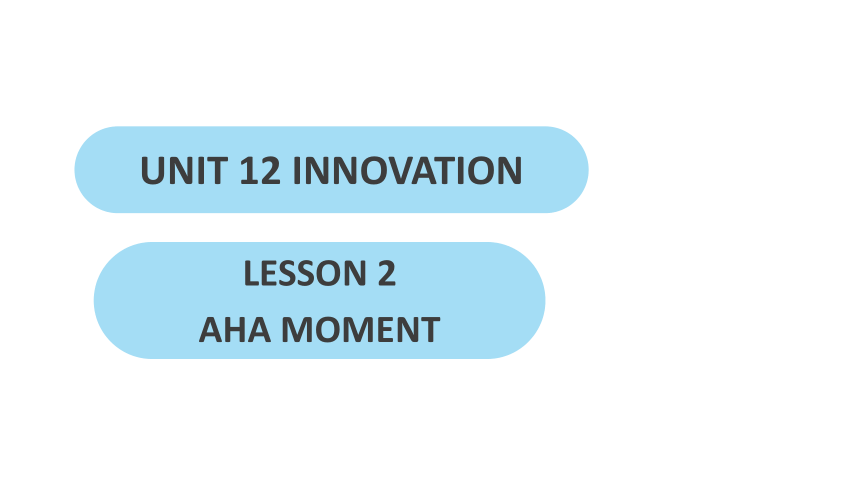 | |
| 格式 | pptx | ||
| 文件大小 | 38.2MB | ||
| 资源类型 | 教案 | ||
| 版本资源 | 北师大版(2019) | ||
| 科目 | 英语 | ||
| 更新时间 | 2025-04-01 20:35:51 | ||
图片预览

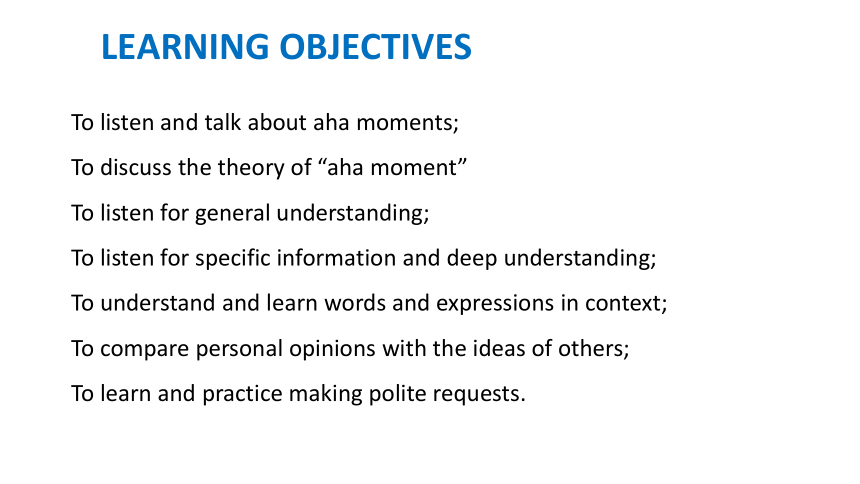
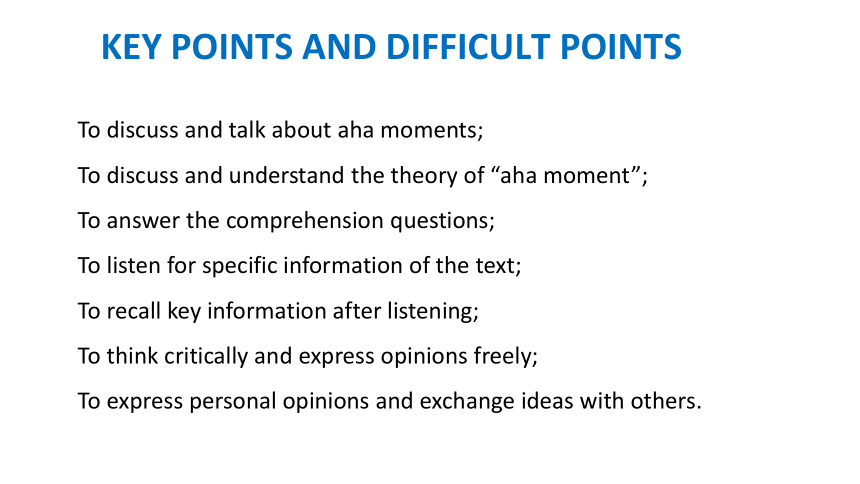
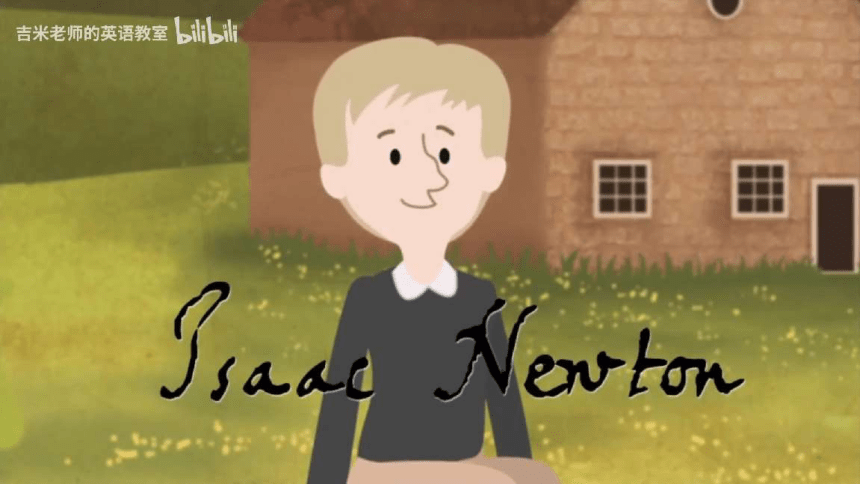
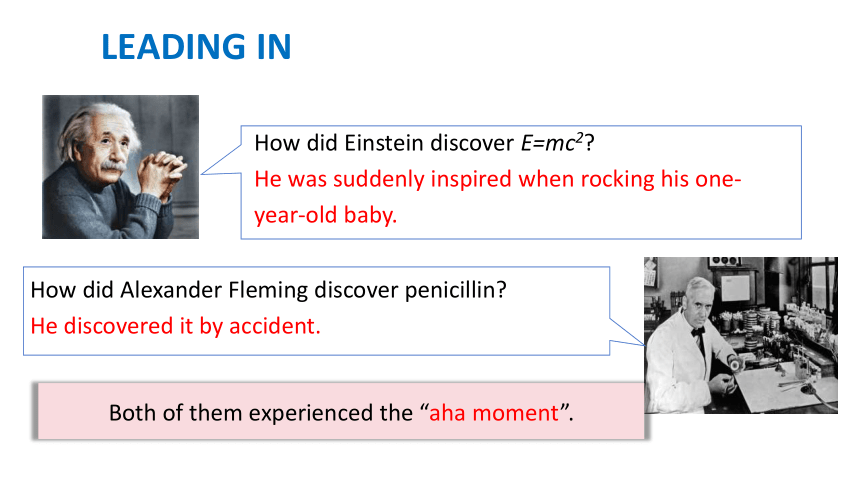
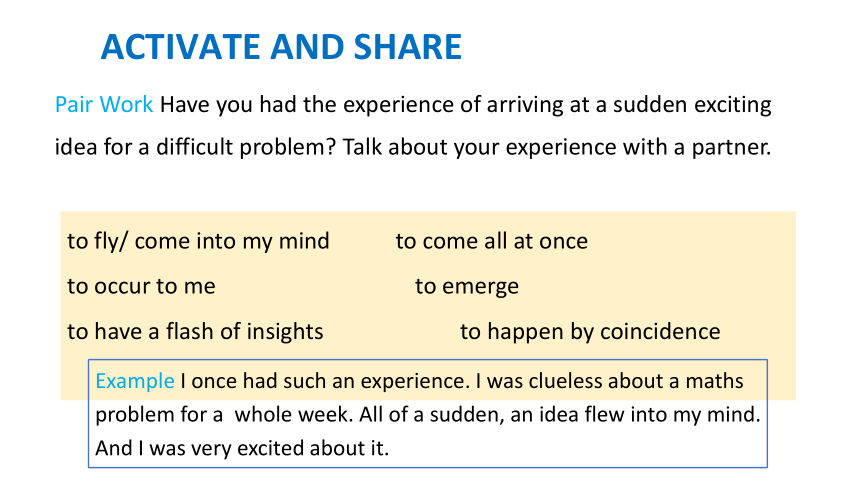
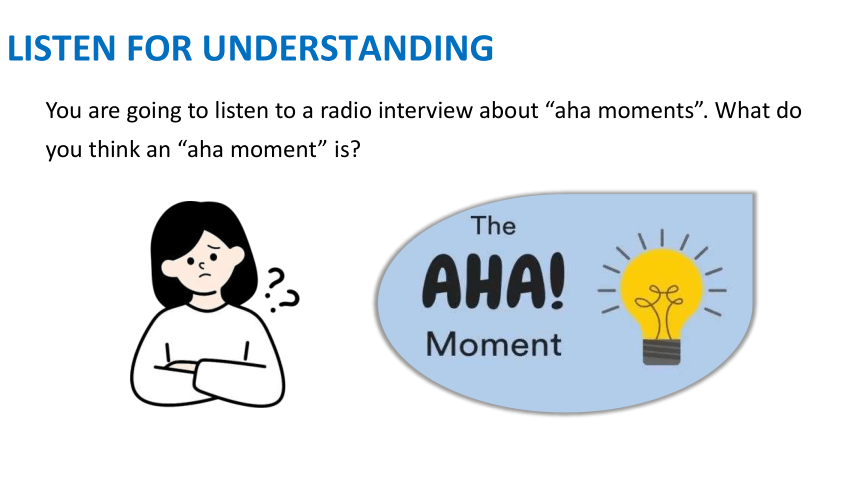
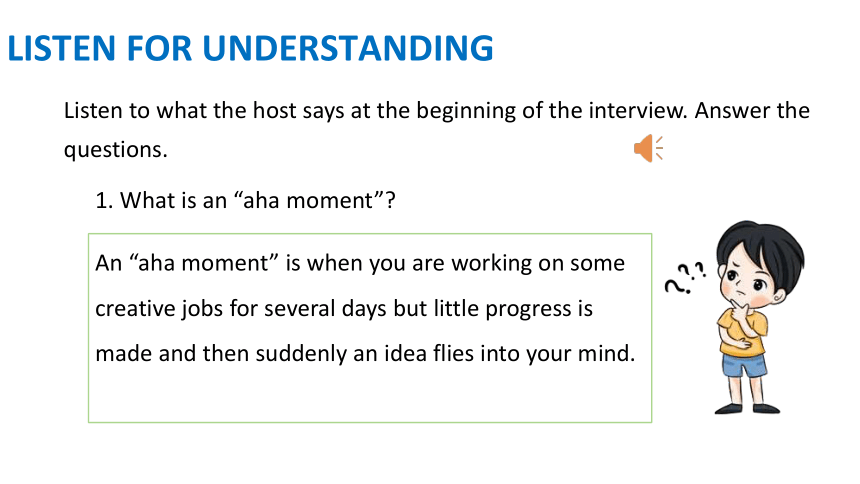
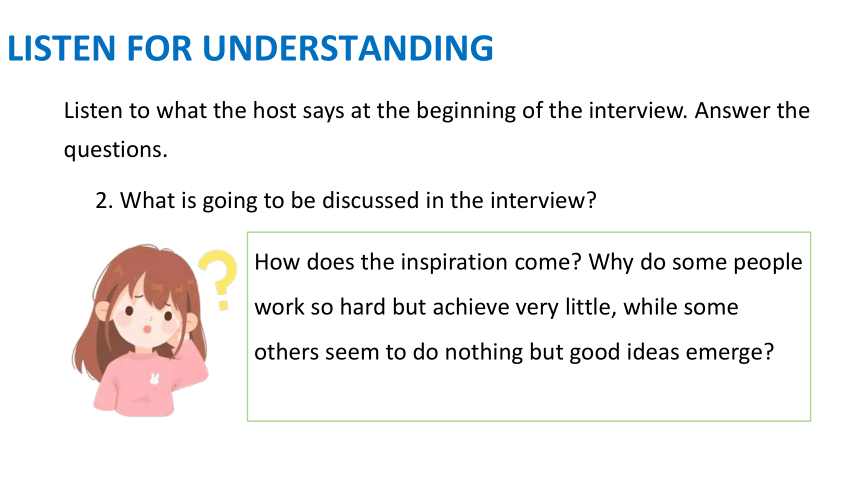
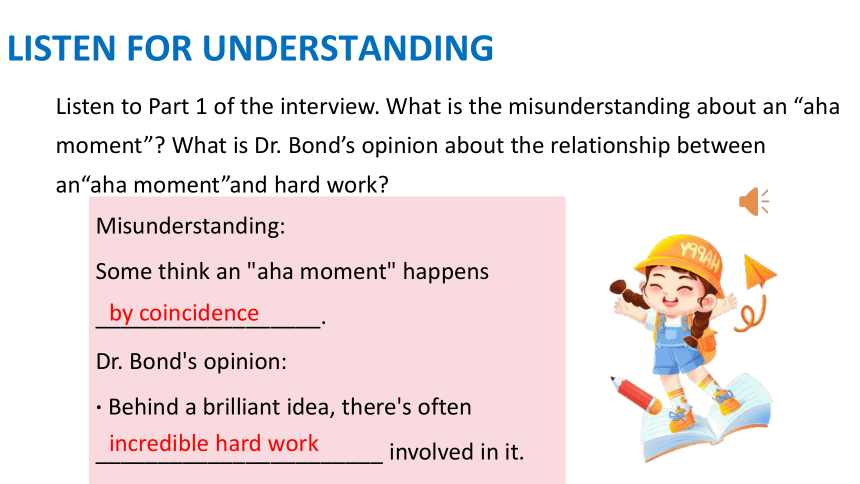
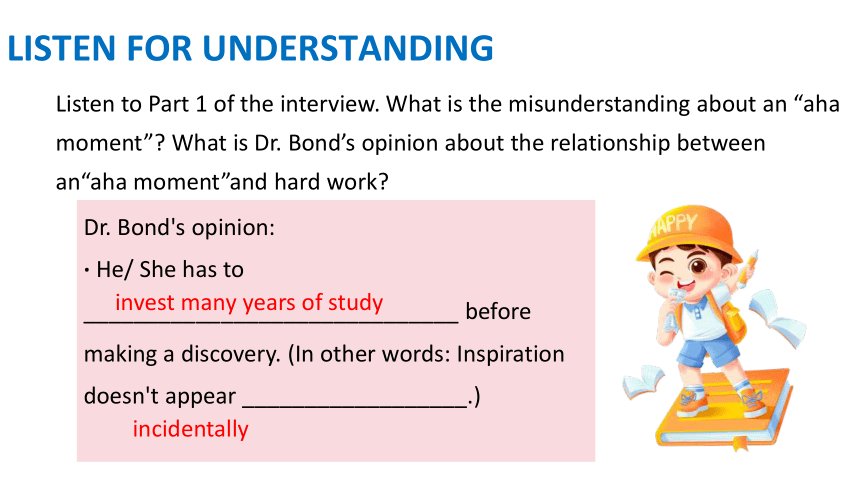
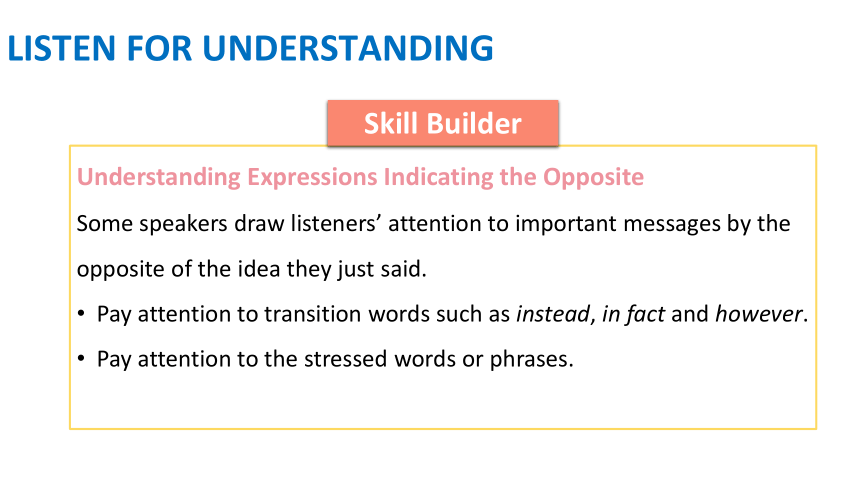
文档简介
(共36张PPT)
LESSON 2
AHA MOMENT
UNIT 12 INNOVATION
LEARNING OBJECTIVES
To listen and talk about aha moments;
To discuss the theory of “aha moment”
To listen for general understanding;
To listen for specific information and deep understanding;
To understand and learn words and expressions in context;
To compare personal opinions with the ideas of others;
To learn and practice making polite requests.
KEY POINTS AND DIFFICULT POINTS
To discuss and talk about aha moments;
To discuss and understand the theory of “aha moment”;
To answer the comprehension questions;
To listen for specific information of the text;
To recall key information after listening;
To think critically and express opinions freely;
To express personal opinions and exchange ideas with others.
LEADING IN
How did Einstein discover E=mc2
He was suddenly inspired when rocking his one-year-old baby.
How did Alexander Fleming discover penicillin
He discovered it by accident.
Both of them experienced the “aha moment”.
ACTIVATE AND SHARE
Pair Work Have you had the experience of arriving at a sudden exciting idea for a difficult problem Talk about your experience with a partner.
to fly/ come into my mind to come all at once
to occur to me to emerge
to have a flash of insights to happen by coincidence
Example I once had such an experience. I was clueless about a maths problem for a whole week. All of a sudden, an idea flew into my mind. And I was very excited about it.
LISTEN FOR UNDERSTANDING
You are going to listen to a radio interview about “aha moments”. What do you think an “aha moment” is
LISTEN FOR UNDERSTANDING
Listen to what the host says at the beginning of the interview. Answer the questions.
1. What is an “aha moment”
An “aha moment” is when you are working on some creative jobs for several days but little progress is made and then suddenly an idea flies into your mind.
LISTEN FOR UNDERSTANDING
Listen to what the host says at the beginning of the interview. Answer the questions.
2. What is going to be discussed in the interview
How does the inspiration come Why do some people work so hard but achieve very little, while some others seem to do nothing but good ideas emerge
LISTEN FOR UNDERSTANDING
Listen to Part 1 of the interview. What is the misunderstanding about an “aha moment” What is Dr. Bond’s opinion about the relationship between an“aha moment”and hard work
Misunderstanding:
Some think an "aha moment" happens __________________.
Dr. Bond's opinion:
· Behind a brilliant idea, there's often _______________________ involved in it.
by coincidence
incredible hard work
LISTEN FOR UNDERSTANDING
Listen to Part 1 of the interview. What is the misunderstanding about an “aha moment” What is Dr. Bond’s opinion about the relationship between an“aha moment”and hard work
Dr. Bond's opinion:
· He/ She has to ______________________________ before making a discovery. (In other words: Inspiration doesn't appear __________________.)
invest many years of study
incidentally
LISTEN FOR UNDERSTANDING
Understanding Expressions Indicating the Opposite
Some speakers draw listeners’ attention to important messages by the opposite of the idea they just said.
Pay attention to transition words such as instead, in fact and however.
Pay attention to the stressed words or phrases.
Skill Builder
TAPESCRIPTS
(H = host D = Dr. Bond)
H: Good morning, everyone! Have you ever had such an experience: you are working on some creative jobs for several days but little progress was made; suddenly an idea flies into your mind Then you can’t help shouting out: “Aha! That’s it!” Such flash of insight is quite wonderful, isn’t it How does the inspiration come Why do some people work so hard but achieve very little, while some others seem to do nothing but good ideas emerge Today, we invite Dr. Bond to
TAPESCRIPTS
talk about the creative process.
D: Hello! Everyone may have experienced some kinds of “aha moments”. But there’s much misunderstanding about it. Some think it happens by coincidence. In fact, it actually comes from the efforts you have been constantly making.
H: Do you mean that sudden ideas come from the efforts we have been making before
D: Yes. Behind a brilliant idea, there’s often incredible hard
TAPESCRIPTS
work involved in it. For example, great success of a scientist did not come all at once. Instead, he/ she has to invest many
years of study before making a discovery. The great scientist Albert Einstein seemed to be inspired in discovering the “theory of relativity” when he was rocking his baby. But actually, he had buried himself a great deal in the study of it for years.
H: I see. Inspiration doesn’t appear incidentally.
LISTEN FOR UNDERSTANDING
What example does Dr. Bond use What indicator does he use to show his opinion in talking about the example
Albert Einstein seemed to be inspired in discovering the “theory of relativity” when he was rocking his baby. But actually, he had buried himself a great deal in the study of it for years. The indicator Dr. Bond uses is “but actually”.
LISTEN FOR UNDERSTANDING
Listen to Part 2 of the interview. Write down the four stages of the creative process. What does each one possibly mean
Stage 1 p_____________
Stage 2 incubation
Stage 3 e_____________
Stage 4 e_____________
reparation
valuation
laboration
TAPESCRIPTS
(H=Host D=Dr. Bond)
H: But does it mean hard work will lead to an “aha moment”
D: Of course not. There are four stages in the creative process. The first stage is preparation. And the next three stages are incubation, evaluation and elaboration. I will explain them further in the second period.
H: OK, thank you very much, Dr. Bond. We’ll be back soon. Please stay with us.
LISTEN FOR UNDERSTANDING
Underline and correct the wrong information in the following statements.
1. “Aha moments” happen by coincidence.
2. The discovery of the “theory of relativity ”came easily when Albert Einstein was rocking his baby.
It actually comes from the efforts you have been constantly making.
But actually, he had buried himself a great deal in the study of it for years.
LISTEN FOR UNDERSTANDING
Underline and correct the wrong information in the following statements.
3. According to the radio interview, only a few people have experienced "aha moments".
4. Dr. Bond's opinion is that all hard work will lead to "aha moments".
Everyone may have experienced some kinds of "aha moments".
No, he doesn't believe that.
Listen to the interview. Answer the questions.
FOCUS ON FUNCTION: POLITE REQUESTS
1. How does Dr. Bond explain what he means by "incubation"
2. Why is incubation important
People bury themselves in an area, keep calm and wait for ideas to grow.
Because creative insights take time to grow or emerge.
Listen to the interview. Answer the questions.
FOCUS ON FUNCTION: POLITE REQUESTS
3. What are the two example questions to ask at the stage of evaluation
4. What do you do in the elaboration phase of the creative process
Does it really work How does it work
You spend hours and hours to write out your articles or make your business plans.
Listen and plete the Talk Builder.
Polite Requests
1. __________________________ more about the stages
2. __________________ what "incubation" means
3. __________________ "doing nothing"
4. __________________ I don't understand what "elaboration" means.
Would you please tell us
I’m afraid
Would you please tell us
Does that mean
Could you explain
FOCUS ON FUNCTION: POLITE REQUESTS
Could you explain
Does that mean
I'm afraid
TAPESCRIPTS
(H = Host D = Dr. Bond)
H: Hello, everyone. Welcome back. So Dr. Bond, just now you talked about the four stages before an “aha moment” may occur. Would you please tell us more about the stages
D: Sure. As I said, the first stage is“preparation”. You need to become deeply involved in the field or area.
H: Could you explain what “incubation” means
D: After you become deeply involved in an area, you do nothing. You just bury yourself in it. For example, Mozart used to spend hours a day just walking around. Then
TAPESCRIPTS
suddenly, he had the “aha experience”.
H: Does that mean “doing nothing”
D: Well, most of us think it’s a waste of time if we do nothing meaningful or creative. In fact, this is not often the case. All we need to understand is that creative insights take time to grow or emerge.
H: OK. I see. We shouldn’t worry but keep calm and wait for ideas to grow, right
D: Exactly. The third stage is called“evaluation”. Once some
TAPESCRIPTS
ideas come up, don’t accept or act immediately, but think carefully first. Ask yourself questions like: Does it really work How does it work Then if the idea is reasonable, the last stage is “elaboration”.
H: I’m afraid I don’t understand what “elaboration” means. Can you explain more
D: This means that you spend hours and hours to write out your articles or make your business plans. That is the whole creative process.
H: Thanks for sharing those interesting views about “aha moments”!
In what situation or to whom would you use polite requests
FOCUS ON FUNCTION: POLITE REQUESTS
Possible situations
Asking for direction
Borrowing something
Seeking clarification from a teacher
Making inquiries in a library
Possible
listeners
A stranger
A teacher
The elderly
An authority figure
In what situation or to whom would you use polite requests
FOCUS ON FUNCTION: POLITE REQUESTS
I would use polite requests to my teachers, people I don’t know well and the elderly.
Why do you use polite requests
To show good manners, to build positive relationships, to increase the likelihood of getting what we ask for,...
SPEAK
Group Work Do you agree with Dr. Bond’s theory of “aha moments” Why or why not
· Summarize what Dr. Bond has explained about the “aha moment”, give a short explanation of it and an example.
· Discuss whether you agree or disagree with the theory and provide reasons for it.
VOCABULARY
1. moment
at the moment 此刻;当时 wait a moment 稍等一下
for a moment 片刻,一会儿;暂时 every moment 时时刻刻
for the moment 暂时,暂且;目前 in a moment 立刻
at this moment 现在;在这个瞬间 at any moment 随时
at that moment 在那时刻,就在那时
练习:I'm not in the market for a new car at the ____________.
moment
VOCABULARY
2. emerge
emerge from 从 ; 曾经一度遭到 ; 摆脱 ; 浮现
emerge in endlessly 层出不穷 ; 司空见惯 ; 屡见不鲜
emerge one after another 层出不穷 ; 层出叠见
emerging adj. 新兴的 emerging industry 新兴产业
练习:Further evidence of slowing economic growth is likely to ______________ this week.
emerge
VOCABULARY
3. evaluation
policy evaluation 政策评价 function evaluation 功能评价
quality evaluation 质量评价 economic evaluation 经济评价
environmental evaluation 环境评价
expert evaluation 专家评估
evaluate vt. 评估;评价;估计
练习:They are requested to ___________ the consequences caused by the fire.
evaluate
VOCABULARY
4. bury oneself in
bury oneself in = be buried in 专心致志于
bury... in sth. 使陷入,把……插入某物
devote oneself to = be devoted to 专心于……,致力于……
lose oneself in = be lost in 沉迷于;专心致志于
seat oneself = be seated 就座
练习:You will have to ____________________ your studies if you want to pass the exam.
bury yourself in
PRACTICE
1. Following this critique, students rewrite their papers and submit them for final __________________ (evaluate).
2. Correct policies only emerge _______________ a thorough understanding of the actual situation.
3. The researcher _________________ (bury) himself in the investigation with the hope of a new finding.
4. Within _________________ (moment) , he'd attracted an admiring audience.
evaluation
from
buried
moments
SUMMARY
Listen and talk about aha moments;
Understand and discuss the theory of “aha moment”
To listen for general understanding;
To listen for specific information and deep understanding;
Recall key information previously heard;
Learn about and practice words and expressions in context;
Express personal opinions and exchange ideas with others;
Learn and practice making polite requests.
Thank you
LESSON 2
AHA MOMENT
UNIT 12 INNOVATION
LEARNING OBJECTIVES
To listen and talk about aha moments;
To discuss the theory of “aha moment”
To listen for general understanding;
To listen for specific information and deep understanding;
To understand and learn words and expressions in context;
To compare personal opinions with the ideas of others;
To learn and practice making polite requests.
KEY POINTS AND DIFFICULT POINTS
To discuss and talk about aha moments;
To discuss and understand the theory of “aha moment”;
To answer the comprehension questions;
To listen for specific information of the text;
To recall key information after listening;
To think critically and express opinions freely;
To express personal opinions and exchange ideas with others.
LEADING IN
How did Einstein discover E=mc2
He was suddenly inspired when rocking his one-year-old baby.
How did Alexander Fleming discover penicillin
He discovered it by accident.
Both of them experienced the “aha moment”.
ACTIVATE AND SHARE
Pair Work Have you had the experience of arriving at a sudden exciting idea for a difficult problem Talk about your experience with a partner.
to fly/ come into my mind to come all at once
to occur to me to emerge
to have a flash of insights to happen by coincidence
Example I once had such an experience. I was clueless about a maths problem for a whole week. All of a sudden, an idea flew into my mind. And I was very excited about it.
LISTEN FOR UNDERSTANDING
You are going to listen to a radio interview about “aha moments”. What do you think an “aha moment” is
LISTEN FOR UNDERSTANDING
Listen to what the host says at the beginning of the interview. Answer the questions.
1. What is an “aha moment”
An “aha moment” is when you are working on some creative jobs for several days but little progress is made and then suddenly an idea flies into your mind.
LISTEN FOR UNDERSTANDING
Listen to what the host says at the beginning of the interview. Answer the questions.
2. What is going to be discussed in the interview
How does the inspiration come Why do some people work so hard but achieve very little, while some others seem to do nothing but good ideas emerge
LISTEN FOR UNDERSTANDING
Listen to Part 1 of the interview. What is the misunderstanding about an “aha moment” What is Dr. Bond’s opinion about the relationship between an“aha moment”and hard work
Misunderstanding:
Some think an "aha moment" happens __________________.
Dr. Bond's opinion:
· Behind a brilliant idea, there's often _______________________ involved in it.
by coincidence
incredible hard work
LISTEN FOR UNDERSTANDING
Listen to Part 1 of the interview. What is the misunderstanding about an “aha moment” What is Dr. Bond’s opinion about the relationship between an“aha moment”and hard work
Dr. Bond's opinion:
· He/ She has to ______________________________ before making a discovery. (In other words: Inspiration doesn't appear __________________.)
invest many years of study
incidentally
LISTEN FOR UNDERSTANDING
Understanding Expressions Indicating the Opposite
Some speakers draw listeners’ attention to important messages by the opposite of the idea they just said.
Pay attention to transition words such as instead, in fact and however.
Pay attention to the stressed words or phrases.
Skill Builder
TAPESCRIPTS
(H = host D = Dr. Bond)
H: Good morning, everyone! Have you ever had such an experience: you are working on some creative jobs for several days but little progress was made; suddenly an idea flies into your mind Then you can’t help shouting out: “Aha! That’s it!” Such flash of insight is quite wonderful, isn’t it How does the inspiration come Why do some people work so hard but achieve very little, while some others seem to do nothing but good ideas emerge Today, we invite Dr. Bond to
TAPESCRIPTS
talk about the creative process.
D: Hello! Everyone may have experienced some kinds of “aha moments”. But there’s much misunderstanding about it. Some think it happens by coincidence. In fact, it actually comes from the efforts you have been constantly making.
H: Do you mean that sudden ideas come from the efforts we have been making before
D: Yes. Behind a brilliant idea, there’s often incredible hard
TAPESCRIPTS
work involved in it. For example, great success of a scientist did not come all at once. Instead, he/ she has to invest many
years of study before making a discovery. The great scientist Albert Einstein seemed to be inspired in discovering the “theory of relativity” when he was rocking his baby. But actually, he had buried himself a great deal in the study of it for years.
H: I see. Inspiration doesn’t appear incidentally.
LISTEN FOR UNDERSTANDING
What example does Dr. Bond use What indicator does he use to show his opinion in talking about the example
Albert Einstein seemed to be inspired in discovering the “theory of relativity” when he was rocking his baby. But actually, he had buried himself a great deal in the study of it for years. The indicator Dr. Bond uses is “but actually”.
LISTEN FOR UNDERSTANDING
Listen to Part 2 of the interview. Write down the four stages of the creative process. What does each one possibly mean
Stage 1 p_____________
Stage 2 incubation
Stage 3 e_____________
Stage 4 e_____________
reparation
valuation
laboration
TAPESCRIPTS
(H=Host D=Dr. Bond)
H: But does it mean hard work will lead to an “aha moment”
D: Of course not. There are four stages in the creative process. The first stage is preparation. And the next three stages are incubation, evaluation and elaboration. I will explain them further in the second period.
H: OK, thank you very much, Dr. Bond. We’ll be back soon. Please stay with us.
LISTEN FOR UNDERSTANDING
Underline and correct the wrong information in the following statements.
1. “Aha moments” happen by coincidence.
2. The discovery of the “theory of relativity ”came easily when Albert Einstein was rocking his baby.
It actually comes from the efforts you have been constantly making.
But actually, he had buried himself a great deal in the study of it for years.
LISTEN FOR UNDERSTANDING
Underline and correct the wrong information in the following statements.
3. According to the radio interview, only a few people have experienced "aha moments".
4. Dr. Bond's opinion is that all hard work will lead to "aha moments".
Everyone may have experienced some kinds of "aha moments".
No, he doesn't believe that.
Listen to the interview. Answer the questions.
FOCUS ON FUNCTION: POLITE REQUESTS
1. How does Dr. Bond explain what he means by "incubation"
2. Why is incubation important
People bury themselves in an area, keep calm and wait for ideas to grow.
Because creative insights take time to grow or emerge.
Listen to the interview. Answer the questions.
FOCUS ON FUNCTION: POLITE REQUESTS
3. What are the two example questions to ask at the stage of evaluation
4. What do you do in the elaboration phase of the creative process
Does it really work How does it work
You spend hours and hours to write out your articles or make your business plans.
Listen and plete the Talk Builder.
Polite Requests
1. __________________________ more about the stages
2. __________________ what "incubation" means
3. __________________ "doing nothing"
4. __________________ I don't understand what "elaboration" means.
Would you please tell us
I’m afraid
Would you please tell us
Does that mean
Could you explain
FOCUS ON FUNCTION: POLITE REQUESTS
Could you explain
Does that mean
I'm afraid
TAPESCRIPTS
(H = Host D = Dr. Bond)
H: Hello, everyone. Welcome back. So Dr. Bond, just now you talked about the four stages before an “aha moment” may occur. Would you please tell us more about the stages
D: Sure. As I said, the first stage is“preparation”. You need to become deeply involved in the field or area.
H: Could you explain what “incubation” means
D: After you become deeply involved in an area, you do nothing. You just bury yourself in it. For example, Mozart used to spend hours a day just walking around. Then
TAPESCRIPTS
suddenly, he had the “aha experience”.
H: Does that mean “doing nothing”
D: Well, most of us think it’s a waste of time if we do nothing meaningful or creative. In fact, this is not often the case. All we need to understand is that creative insights take time to grow or emerge.
H: OK. I see. We shouldn’t worry but keep calm and wait for ideas to grow, right
D: Exactly. The third stage is called“evaluation”. Once some
TAPESCRIPTS
ideas come up, don’t accept or act immediately, but think carefully first. Ask yourself questions like: Does it really work How does it work Then if the idea is reasonable, the last stage is “elaboration”.
H: I’m afraid I don’t understand what “elaboration” means. Can you explain more
D: This means that you spend hours and hours to write out your articles or make your business plans. That is the whole creative process.
H: Thanks for sharing those interesting views about “aha moments”!
In what situation or to whom would you use polite requests
FOCUS ON FUNCTION: POLITE REQUESTS
Possible situations
Asking for direction
Borrowing something
Seeking clarification from a teacher
Making inquiries in a library
Possible
listeners
A stranger
A teacher
The elderly
An authority figure
In what situation or to whom would you use polite requests
FOCUS ON FUNCTION: POLITE REQUESTS
I would use polite requests to my teachers, people I don’t know well and the elderly.
Why do you use polite requests
To show good manners, to build positive relationships, to increase the likelihood of getting what we ask for,...
SPEAK
Group Work Do you agree with Dr. Bond’s theory of “aha moments” Why or why not
· Summarize what Dr. Bond has explained about the “aha moment”, give a short explanation of it and an example.
· Discuss whether you agree or disagree with the theory and provide reasons for it.
VOCABULARY
1. moment
at the moment 此刻;当时 wait a moment 稍等一下
for a moment 片刻,一会儿;暂时 every moment 时时刻刻
for the moment 暂时,暂且;目前 in a moment 立刻
at this moment 现在;在这个瞬间 at any moment 随时
at that moment 在那时刻,就在那时
练习:I'm not in the market for a new car at the ____________.
moment
VOCABULARY
2. emerge
emerge from 从 ; 曾经一度遭到 ; 摆脱 ; 浮现
emerge in endlessly 层出不穷 ; 司空见惯 ; 屡见不鲜
emerge one after another 层出不穷 ; 层出叠见
emerging adj. 新兴的 emerging industry 新兴产业
练习:Further evidence of slowing economic growth is likely to ______________ this week.
emerge
VOCABULARY
3. evaluation
policy evaluation 政策评价 function evaluation 功能评价
quality evaluation 质量评价 economic evaluation 经济评价
environmental evaluation 环境评价
expert evaluation 专家评估
evaluate vt. 评估;评价;估计
练习:They are requested to ___________ the consequences caused by the fire.
evaluate
VOCABULARY
4. bury oneself in
bury oneself in = be buried in 专心致志于
bury... in sth. 使陷入,把……插入某物
devote oneself to = be devoted to 专心于……,致力于……
lose oneself in = be lost in 沉迷于;专心致志于
seat oneself = be seated 就座
练习:You will have to ____________________ your studies if you want to pass the exam.
bury yourself in
PRACTICE
1. Following this critique, students rewrite their papers and submit them for final __________________ (evaluate).
2. Correct policies only emerge _______________ a thorough understanding of the actual situation.
3. The researcher _________________ (bury) himself in the investigation with the hope of a new finding.
4. Within _________________ (moment) , he'd attracted an admiring audience.
evaluation
from
buried
moments
SUMMARY
Listen and talk about aha moments;
Understand and discuss the theory of “aha moment”
To listen for general understanding;
To listen for specific information and deep understanding;
Recall key information previously heard;
Learn about and practice words and expressions in context;
Express personal opinions and exchange ideas with others;
Learn and practice making polite requests.
Thank you
同课章节目录
- Unit 10 Connections
- Lesson 1 How Closely Connected Are We?
- Lesson 2 Community Spirit
- Lesson 3 Anne of Green Gables
- Unit 11 Conflict And Compromise
- Lesson 1 Living In a Community
- Lesson 2 Dealing with Conflict
- Lesson 3 War Memories
- Unit 12 Innovation
- Lesson 1 Scientific Breakthroughs
- Lesson 2 Aha Moment
- Lesson 3 Stephen Hawking
